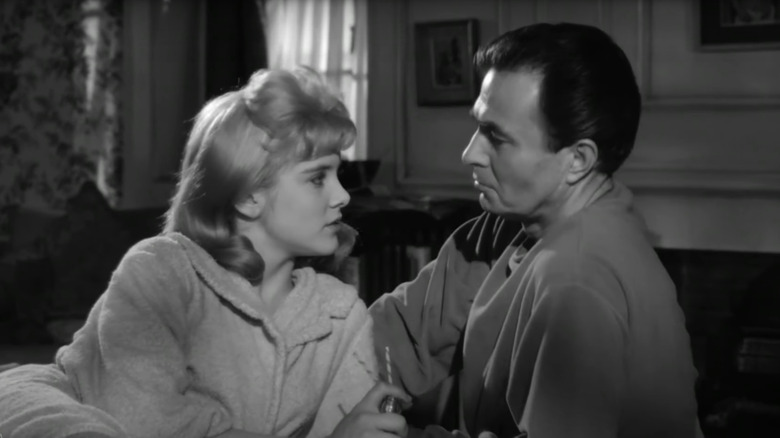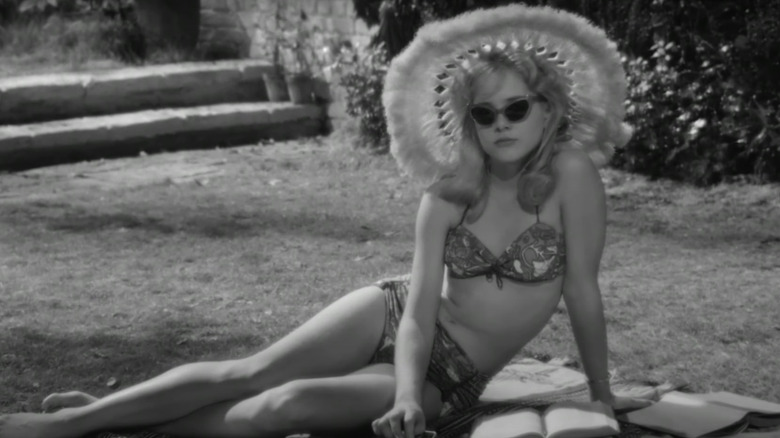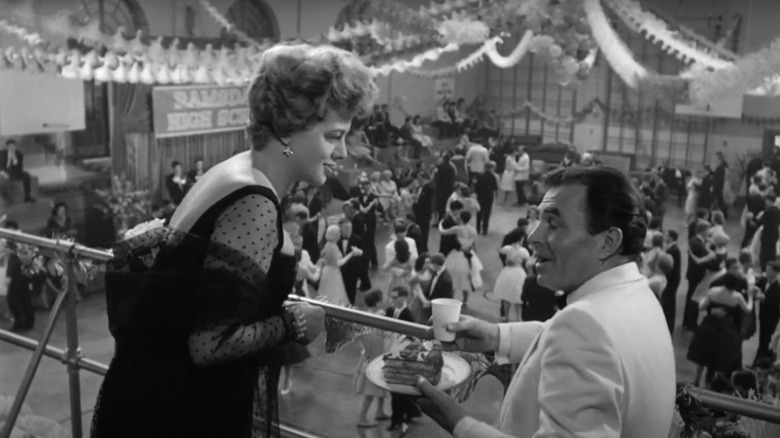Stanley Kubrick Was Forced To Leave America To Find Funding For Lolita
It's not really surprising that Stanley Kubrick never really got along with the whole American studio system of filmmaking. A notorious perfectionist, the director was at his best when retaining all creative control, and he knew it. Hence why he spent a large part of his career holed up in his Hertfordshire manor house. Childwickbury Manor has since become famous among fans of the auteur for being where he planned, wrote, and even edited some of his most famous movies, including the war epic "Full Metal Jacket."
But Kubrick actually made the move to the U.K. long before he took up residence in Childickbury in 1978. Back in 1960, he and his wife Christiane crossed the Atlantic to live just north of London while Kubrick worked on an adaptation of Vladimir Nabokov's now-classic novel "Lolita." The project was to be the director's triumphant escape from the rigidities of the Hollywood system, allowing him to fully realize his vision with minimal to no interference. After his frustrating experience on 1960's "Spartacus," where he was required to follow Dalton Trumbo's script closely, he was determined to retain creative control on "Lolita."
Unfortunately, just as Nabokov had struggled to get a publisher for his novel, eventually relying on a Parisian company to bring it to market, Kubrick found it much more difficult than he'd anticipated to make the film version, despite putting some considerable distance between himself and Hollywood.
Funding led Kubrick to England
It wasn't just creative control that brought Kubrick to the British Isles. Nabokov's "Lolita" had proven controversial upon its release, with its tale of an adult university lecturer who falls for his 12-year-old stepdaughter. That was never going to impress the folks at The Motion Picture Production Code, which set strict guidelines for what could and couldn't be shown in movies. Neither was it going to win over the fun-loving party animals over at the Catholic Legion of Decency, an organization that had significant power to hurt a film's returns by instructing attendees at their churches throughout the U.S. to forgo seeing whatever movie stoked their ire. England, on the other hand, was far enough away that Kubrick could focus on shooting rather than running afoul of theocratic crackpots.
And yet, that wasn't the main motivating force behind his move. Trying to get funding for his controversial adaptation had seen several big studios, including United Artists, Warner Brothers, and Columbia Pictures reject the project. Eventually, the director and his producing partner, James B. Harris, found financial support from a "group of Canadian bankers," who according to TCM, required Kubrick to shoot in England in order to keep production costs low. Meanwhile, as writer Gene Youngblood noted, independent production company Seven Arts also put up money for the film before MGM agreed to distribute.
Kubrick confirmed these financial factors were the main reason for relocating to England in an interview in which he remarked how he would have shot the movie in the U.S., "If the money to film had been available in America." According to the director, the only funds he could raise, "Had to be spent in England," and filming in the U.K. helped "mitigate censorship problems."
England was a perfect base for Kubrick's perfectionism
With finances dictating his moves, Kubrick and Christiane made the move across the pond in 1960 and would remain in the U.K. for the rest of the filmmaker's life, a fact which suggests the relocation was actually about more than money or censorship.
Kubrick shot "Lolita" from 1960–61 at Elstree Studios, staying in the country after that project to make his follow-up film "Dr. Strangelove." As he explained:
"In the case of 'Dr. Strangelove,' Peter Sellers was in the process of getting a divorce and could not leave England for an extended period, so it was necessary to film there. By the time I decided to do '2001' I had gotten so acclimated to working in England that it would have been pointless to tear up roots and move everything to America."
All of which makes sense. But even before other factors forced the director to stay in the U.K., there must have been part of him that saw England as a tempting permanent refuge from the studio system with which Kubrick was so at odds. Even after he'd made the move, he still had to contend with The Motion Picture Production Code to get his film released in the U.S., and has since expressed regret at making the cuts that were demanded before the film could be shown. In fact, he's maintained a fairly questionable attitude to "Lolita" since its release. In that sense, England didn't quite provide the mitigating force he thought it would, and though he was somewhat forced to stay in the U.K. for "Dr. Strangelove," it seems likely he actually preferred the isolation that rural England offered over the intrusive bustle of Hollywood.


